Anuncio
Participa en el evento Origins 2013
Las principales organizaciones científicas europeas formarán parte de la 'Noche de los Investigadores'
18 de Septiembre de 2013
ESO, junto al CERN, la ESA y la UNESCO, en colaboración con el Instituto Italiano de Astrofísica (INAF), invitan al público a participar en Origins 2013 (Orígenes 2013), un evento único que tendrá lugar de manera simultánea en Ginebra, París y Bolonia en la 'Noche de los Investigadores Europeos', a realizarse el viernes 27 de septiembre de 2013. Personas de todo el mundo podrán seguir el evento en directo mediante transmisiones en vivo por Internet (webcasts).
¿Qué tienen en común la física de partículas, la astrofísica y las ciencias espaciales? Todas ellas abordan interrogantes fundamentales que guardan relación con nuestros orígenes: el origen de la materia, el origen del Universo y, posiblemente, los orígenes de la vida misma.
En los últimos meses, el Gran Colisionador de Hadrones (LHC, por sus siglas en inglés), con el descubrimiento de un bosón de Higgs, y el satélite Planck, con la publicación de la imagen más precisa alguna vez obtenida de los inicios del Universo, han logrado importantes avances científicos. Asimismo, el conjunto de telescopios ALMA fue inaugurado recientemente en Chile. Este es el proyecto astronómico más grande en la actualidad y permitirá obtener vistas sin precedentes del cosmos.
Origins 2013 exhibirá estas fascinantes iniciativas científicas. Este evento único destaca los fuertes vínculos existentes entre el reducido ámbito de la física de partículas y el vasto campo de la astrofísica, y los investigadores de ambas esferas compartirán su pasión y conocimiento con el público general.
El público, que asista al CERN en Ginebra, a la sede principal de la UNESCO en París y al centro de la ciudad de Bolonia, se embarcará en un viaje de regreso en el tiempo y el espacio, para aprender más acerca de los orígenes del Universo desde su repentina expansión ocurrida hace 13 mil 800 millones de años atrás. En los tres lugares, los visitantes podrán conocer a los investigadores que participaron en estos logros científicos a través de conversaciones cara a cara en formato speed dating (citas rápidas).
"Con Origins 2013, queremos conmemorar a los miles de investigadores que, a través de su trabajo con instrumentos científicos de vanguardia como el Planck y el LHC, han llevado a la humanidad un paso más adelante en la comprensión de los orígenes de nuestro Universo y han proporcionado una nueva imagen de su composición hoy en día", dijo Sergio Bertolucci, Director de Investigación del CERN. El estará a cargo de la inauguración del evento el viernes 27 de septiembre junto a Mark McCaughrean, Jefe del Departamento de Investigación y Apoyo Científico de la ESA. Ellos estarán conectados por videoconferencia con Gretchen Kalonji, Subdirectora General de Ciencias Naturales de la UNESCO, que abrirá el evento en la sede de la UNESCO en París.
Distintas videoconferencias unirán las tres ciudades europeas al Centro de Control de las Operaciones de la ESA en Darmstadt, Alemania; al Observatorio ALMA en el desierto de Atacama en Chile; y al túnel del LHC, a 100 metros bajo tierra, cerca de Ginebra, Suiza. Además, habrá un enlace directo que permitirá establecer una comunicación con el astronauta de la ESA Luca Parmitano, quien se encuentra a bordo de la Estación Espacial Internacional.
Las reservas para el speed dating y para el webcast en directo desde el CERN deben realizarse a través del sitio oficial de ORIGINS.
Origins 2013 es un proyecto diseñado por el CERN y realizado en asociación con el INAF, con la colaboración de ESO, la ESA y la UNESCO.
Enlaces
Contactos
Lars Lindberg Christensen
Departamento de Educación y Difusión de ESO
Garching bei München, Alemania
Telf: +49 -89 -3200 -6761
Cel: +49 -173 -3872 -621
Correo electrónico: lars@eso.org
Sobre el anuncio
| Identificador: | ann13076 |

